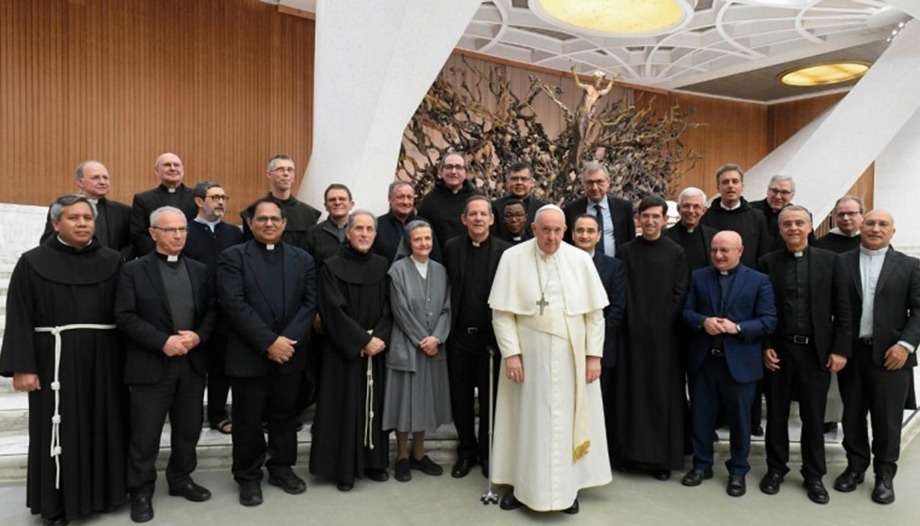Commit yourselves to "make a choir! This is what Pope Francis said this morning, receiving in Audience in the Paul VI Hall thousands of students, professors, employees and Rectors of the Roman Pontifical Universities and Institutions belonging to the Pontifical Council for the Laity. CRUIPRO Rectors' Conference.
A "pluriform system of ecclesiastical studies," the Holy Father defined it, which for centuries has accompanied the Church in her evangelizing mission, seeking to intercept and discern the signs of the times and the different cultural traditions.
Concord and consonance
The Pontiff's main concern was to reiterate - in these academies of higher studies - the importance of agreement and consonance "between different voices and instruments", in line also with what St. John Paul II said in his letter to the Pope. John Henry Newman on the university environment: a place "where knowledge and perspectives are expressed in harmony, complement, correct and balance each other," the Pope said.
Cultivating the intelligence of the hands
A harmony that can be achieved by learning to cultivate, for example, the "intelligence of the hands", the most sensory, from which thought and knowledge start, until they mature mutually. It is not by chance that with the hands," Francis reflected, "we 'grasp' and - playing with similar concepts that lend themselves to the Italian language and other neo-Latin languages - we stimulate the mind to 'understand', 'learn', even allowing ourselves to be 'surprised'.
To achieve this, however, we need hands that are neither stingy - 'closed' - nor 'wasteful of time, health and talents' - 'leaky' - or even that refuse to 'give peace, greet and shake other hands'. All attitudes far removed from the possibility of learning and surprise, all the more so if those same hands "have their fingers mercilessly pointed" at those who do wrong or even "do not know how to join together" to reserve moments of prayer.
Harmony in ourselves
"Hands", rather, that must imitate those of Christ, become "Eucharistic" - Pope Francis added - because in this way they will know how to make "harmony in ourselves", amalgamating together with the other two "intelligences that vibrate in the human soul", that of the mind and that of the heart.
This harmony must also be sought within individual communities and among the various institutions that make up the "Pontifical Roman Pontifical Institutes," which the Pope called to "open themselves to courageous and, if necessary, even unprecedented developments." This, certainly, starting from the richness of a secular tradition and always finding the way to "favor the transmission of evangelical joy" in study, teaching and research, overcoming self-referentiality or the spirit of conservation.
Never soloists without a choir
The final invitation of the Pontiff, echoing the image of the choir, was to "never be soloists without a choir", but to think and live academia and research with "constructive complementarity", remaining "docile to the living action of the Spirit", because after all "hope is a choral reality".
Spirit of unity
Luis NavarroPresident of Cruipro and Rector of the Pontifical University of the Holy Cross, brought greetings on behalf of the 22 Roman Pontifical Universities and Institutions, and reaffirmed the importance of the spirit of union with which these ecclesiastical academic realities are conducting their steps, in the context of the new stage of the Church's mission in today's society.
Report 2022
In anticipation of the desire to "make chorus" expressed by Pope Francis at the Audience, in recent days in Rome a ".unified "report" of the Universities and Institutions The Roman Pontifical Councils, from which emerges a true "cultural laboratory", diversified but animated by the same evangelizing commitment, which wants to measure itself against the challenges and needs of an effective epochal change - as Pope Francis often evokes - that also requires the effort of "a courageous cultural revolution" (Laudato si', 114).
The Roman Pontifical Universities and Institutions currently number 22, distributed in various districts of the City of Rome; the oldest University dates back to 1551 - Pontifical Gregorian Universityentrusted to the Jesuits -, while the youngest one dates from 1984 -, and the most recent - Pontifical University of the Holy Crossentrusted to the Prelature of Opus Dei. There are also 2 Athenaeums, 4 Faculties and 9 Institutes. These academic centers welcome each year about 16,000 students from 125 countries and grant more than 3,000 academic degrees, thanks to the work of no less than 2,000 professors and 450 employees.









